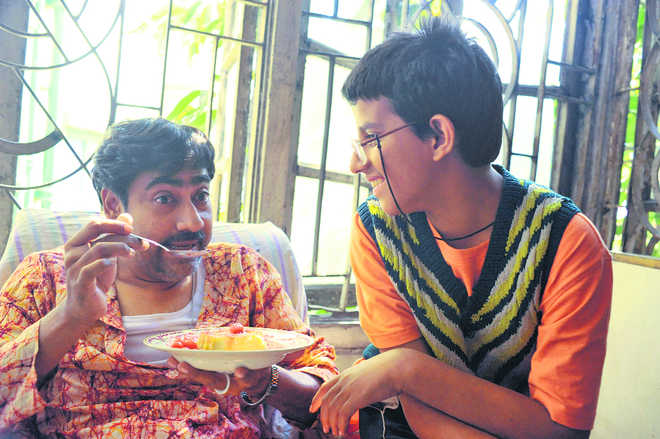Saibal Chatterjee
A quirky and endearing tale of an orphaned special child who fights back against his lot in life, Soukarya Ghosal’s Rainbow Jelly has emphatically surmounted heavy odds. In a market at the mercy of glitz, glamour and other superficial inducements, for a small, independent Bengali film to enjoy an extended run is a minor miracle. Indeed, Rainbow Jelly has magic written all over it.
A modern-day urban fairytale that blends elements of a food fantasy, inspirations from Bengali children’s literature and memories of Ghosal’s own childhood, the film is predicated on the hitherto unexplored theory of the connection between the tastebuds and human emotions. Rainbow Jelly is particularly noteworthy for the fact that Mahabrata Basu, a special child himself, plays the protagonist.
Mahabrata is cast as12-year-old Ghoton, who lives with an abusive maternal uncle Gondariya (a cast-against-type Kaushik Senes saying a character whose name is derived from the Bengali word for rhinoceros). The boy cooks, cleans and runs errands for the demanding old man. Ghoton frequently drifts into his world of dreams, a habit that invariably lands him in trouble with the evil man who controls his life.
“I was a failure in school,” says Ghosal. “Nobody expected me to do much in life. I struggled with numbers and always got confused by street directions. I still do.”
Rainbow Jelly celebrates a boy’s triumph over his inadequacies with the help of his flights of fancy. Redemption at the end of a rough road is inevitably sweet and life-affirming: that is the takeaway the film delivers.
It is Ghosal’s third film after the Radhika Apte-starrer Pendulum (2014) and Load Shedding (2015) and, by far, his most challenging project to date. “It took an intense three-month workshop to prepare Mahabrata for the role,” says the writer-director, who also uses his skills as an illustrator to introduce animation passages into the film to highlight the young protagonist’s vibrant dreamscape. “He is an extremely tenacious boy,” he adds.
It was Mahabrata’s mother who was sceptical to begin with. The boy is not used to mugging up lines for he has never taken an examination, she warned Ghosal. But when told that the film would hinge almost entirely on her son, she helped out. She repeatedly read out the dialogues to Mahabrata until the boy was able to commit these to memory.
That, however, wasn’t the end of the preparatory exercise. The special child now had to be trained to express appropriate emotions to go with the lines he would speak before the camera. At the end of the workshop, Mahabrata was ready to go. And how! Rainbow Jelly owes much of its appeal to his incredibly moving performance.
Ghosal draws upon elements from the stories that Bengali children grow up with to create his ‘classic’ narrative palette: an evil uncle who stops short of being an unassailable monster, a fairy aunt (called Pori Pishi and played by Sreelekha Mitra) who represents the young hero’s belief in magic and directs the boy towards the possibility of miracles in the here and now and a taste-recording robot that is right out of the world of Satyajit Ray’s fictional scientist Professor Shonku.
The machine is Ghoton’s only surviving link with his dead father, the secrets of whose work on taste theory is locked in it. Pori Pishi, with her box of taste-imparting potions, helps the boy induce varied responses from his uncle through the unusual dishes he rustles up for the man.
Says Ghosal: “Is it possible for us to alter our fate? We all think that magic will happen but it never does. But we never abandon hope.” When the rainbow does reveal itself at the end of the tunnel, it can only be doubly sparkling. That is exactly the feeling that an audience fed on a surfeit of pulp is left with after watching Rainbow Jelly.
Unlock Exclusive Insights with The Tribune Premium
Take your experience further with Premium access.
Thought-provoking Opinions, Expert Analysis, In-depth Insights and other Member Only Benefits
Already a Member? Sign In Now











